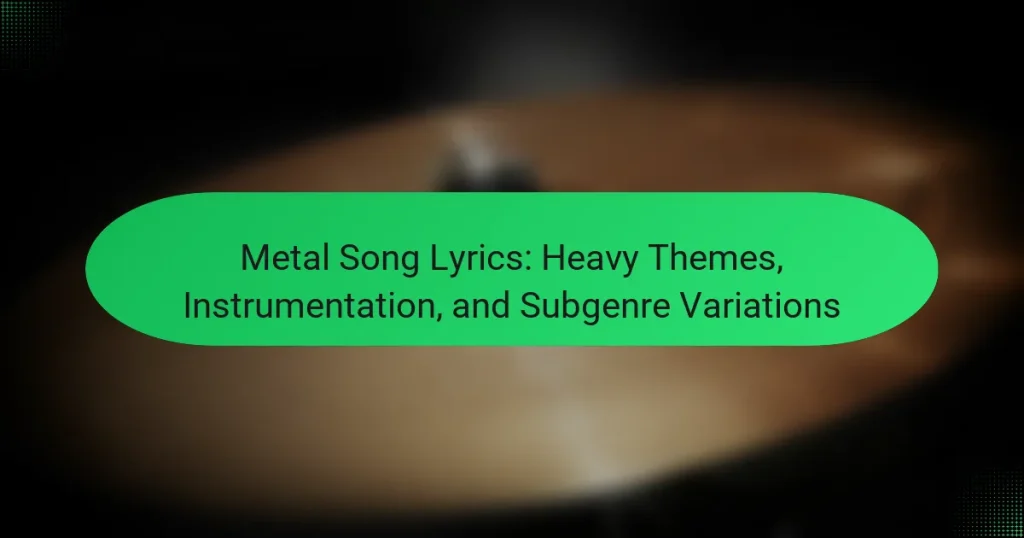Metal song lyrics are characterized by intense themes, complex structures, and vivid imagery, often exploring dark subjects such as death, war, and existentialism. Each subgenre, including black metal, power metal, and death metal, presents distinct thematic elements and stylistic features that shape the vocabulary and imagery used in the lyrics. The use of metaphors, allegories, and intricate rhyme schemes enhances emotional expression and reflects societal issues such as politics and identity. Analyzing these lyrics reveals their role in evoking strong emotional responses and fostering a sense of community among fans, while also highlighting the genre’s artistic depth and cultural significance.

What are the key characteristics of metal song lyrics?
Metal song lyrics are characterized by their intense themes, complex structures, and vivid imagery. They often explore dark subjects such as death, war, and existentialism. Many lyrics incorporate storytelling elements, creating narratives that resonate with listeners. The use of metaphors and allegories is prevalent, enhancing the emotional impact. Additionally, metal lyrics frequently feature a confrontational tone, reflecting rebellion and defiance. Many songs also employ intricate rhyme schemes and alliteration, adding to their rhythmic quality. The language used is often vivid and descriptive, painting striking visuals for the audience. Overall, metal lyrics serve to evoke strong emotional responses while addressing profound themes.
How do heavy themes manifest in metal song lyrics?
Heavy themes in metal song lyrics manifest through dark imagery, existential dread, and social commentary. Lyrics often explore topics such as death, war, and personal struggle. This genre uses vivid metaphors and aggressive language to convey intense emotions. For example, bands like Slayer and Metallica address themes of violence and despair. Additionally, concepts like mental illness and addiction are prevalent in many songs. The use of complex narratives adds depth to these themes. Heavy themes resonate with listeners by reflecting real-world issues. Overall, metal lyrics serve as a powerful medium for expressing heavy and often uncomfortable subjects.
What are common heavy themes found in metal lyrics?
Common heavy themes found in metal lyrics include death, violence, and existentialism. Death is often portrayed through imagery of mortality and loss. Violence is depicted in various forms, including war and personal struggles. Existentialism explores the meaning of life and individual purpose. Other prevalent themes are rebellion against authority and social issues. Many lyrics also delve into fantasy and mythology. These themes resonate with listeners, offering catharsis and reflection. The intensity of the music complements these heavy lyrical topics, creating a powerful emotional experience.
How do these themes reflect the culture of metal music?
Themes in metal music often reflect rebellion, individuality, and dark introspection. These themes resonate with the culture by embodying a countercultural ethos. Lyrics frequently explore topics like mortality, existentialism, and social issues. This exploration allows listeners to confront their fears and societal norms. The aggressive instrumentation complements these themes, creating a cathartic experience. Metal culture embraces diversity in subgenres, each with unique thematic focuses. For example, death metal delves into horror and violence, while power metal often celebrates fantasy and heroism. This variety reflects the multifaceted nature of human experience, appealing to a wide audience. Overall, the themes in metal music serve as a powerful reflection of its culture.
What role does instrumentation play in metal song lyrics?
Instrumentation in metal song lyrics enhances emotional expression and narrative depth. It complements lyrical themes by providing a sonic backdrop that reflects the intensity of the lyrics. For instance, heavy guitar riffs often align with aggressive or dark lyrical content. Drumming patterns can underscore urgency or chaos, reinforcing the song’s message. Additionally, instrumentation varies across subgenres, influencing the overall mood. In progressive metal, intricate arrangements may convey complexity in lyrics. In contrast, thrash metal’s fast-paced instrumentation often matches themes of rebellion. This synergy between instrumentation and lyrics is crucial in creating a cohesive listening experience.
How does instrumentation influence the emotional tone of metal lyrics?
Instrumentation significantly influences the emotional tone of metal lyrics. The use of heavy guitar riffs creates a sense of aggression and intensity. Fast-paced drumming contributes to feelings of urgency and chaos. Melodic elements can evoke sadness or nostalgia, contrasting with harsher sounds. Dissonant chords often enhance themes of despair or conflict. Instrumentation sets the atmosphere, guiding listener emotions throughout the song. For example, bands like Metallica use dynamic shifts to amplify lyrical content. Overall, the combination of various instrumental techniques shapes the listener’s emotional experience.
What instruments are commonly associated with metal music?
Electric guitar is the primary instrument associated with metal music. It produces powerful riffs and solos that define the genre. The electric bass complements the guitar, providing depth and rhythm. Drums create the aggressive beats typical in metal tracks. Keyboards are also used, adding atmospheric elements in some subgenres. Vocals, often featuring growls or high-pitched screams, are essential to metal’s identity. These instruments collectively contribute to the heavy sound characteristic of metal music.

How do subgenre variations impact metal song lyrics?
Subgenre variations significantly influence metal song lyrics. Each subgenre has distinct themes and stylistic elements. For example, black metal often explores themes of darkness and nihilism. In contrast, power metal focuses on fantasy and heroism. Death metal lyrics frequently delve into graphic violence and mortality. These thematic differences shape the vocabulary and imagery used in the lyrics. Additionally, the musical style affects lyrical structure. Faster tempos may lead to more aggressive language, while slower tempos can allow for more poetic expression. Research indicates that these variations create diverse lyrical landscapes within the metal genre.
What are the primary subgenres of metal music?
The primary subgenres of metal music include heavy metal, thrash metal, death metal, black metal, power metal, and doom metal. Heavy metal is characterized by its loud, aggressive sound and powerful vocals. Thrash metal features fast tempos and intricate guitar riffs. Death metal is known for its growled vocals and complex song structures. Black metal emphasizes atmosphere and often includes themes of darkness and nature. Power metal is marked by its melodic sound and fantasy-themed lyrics. Doom metal is slower and often conveys themes of despair and melancholy. Each subgenre has distinct characteristics that contribute to the overall diversity of metal music.
How do lyrical themes differ across various metal subgenres?
Lyrical themes in metal subgenres differ significantly in focus and content. For example, black metal often explores themes of darkness, nature, and anti-religious sentiments. Death metal typically centers on mortality, violence, and existential dread. Thrash metal emphasizes rebellion and social issues, often critiquing political systems. Power metal, in contrast, focuses on fantasy, heroism, and epic narratives. Doom metal tends to dwell on despair, loss, and slow, heavy riffs. Each subgenre’s lyrical content reflects its unique cultural and musical influences. This diversity in themes contributes to the richness of metal as a genre.
What unique attributes do specific subgenres bring to metal lyrics?
Specific subgenres of metal bring unique attributes to lyrics that reflect their themes and styles. For example, black metal often features dark, atmospheric imagery and themes of nature, [censured], and anti-religion. Death metal lyrics typically focus on graphic violence, horror, and existential themes. Power metal, in contrast, emphasizes fantasy, heroism, and epic storytelling. Progressive metal incorporates complex narratives and philosophical concepts, often exploring the human condition. Thrash metal lyrics often critique societal issues, politics, and rebellion. Each subgenre’s distinct lyrical focus enhances the overall identity and emotional impact of the music. These attributes are rooted in the cultural and historical contexts of the respective subgenres.
How can listeners identify subgenre characteristics in metal lyrics?
Listeners can identify subgenre characteristics in metal lyrics by analyzing thematic content and stylistic elements. Each metal subgenre has distinct themes. For example, black metal often explores darkness, nature, and anti-religious sentiments. In contrast, power metal frequently emphasizes fantasy, heroism, and epic narratives.
Additionally, the use of language varies by subgenre. Death metal lyrics tend to be graphic and visceral, focusing on violence and mortality. Thrash metal often incorporates political and social commentary.
Listeners can also pay attention to the lyrical structure. Some subgenres, like doom metal, utilize slower tempos and melancholic imagery, while others, such as speed metal, feature fast-paced, energetic lyrics.
Moreover, the presence of specific vocabulary and metaphors can signal a subgenre. For instance, references to mythology may indicate a connection to power metal.
By understanding these elements, listeners can effectively discern the subgenre characteristics present in metal lyrics.
What lyrical elements signal a particular subgenre?
Lyrical elements that signal a particular metal subgenre include themes, vocabulary, and imagery. For instance, death metal often features graphic violence and existential themes. Black metal typically incorporates nature and anti-religious sentiments. Power metal emphasizes fantasy narratives and heroic imagery. Doom metal focuses on despair and slow tempos, reflected in its lyrics. Thrash metal showcases aggression and social commentary. These elements help identify and differentiate subgenres within metal music.
How does the audience’s perception change with different subgenres?
Audience perception shifts significantly with different metal subgenres. Each subgenre evokes distinct emotional responses and thematic interpretations. For instance, death metal often elicits feelings of aggression and darkness. In contrast, power metal tends to inspire feelings of heroism and triumph.
The lyrical content also influences perception. Black metal’s themes of nihilism and anti-establishment resonate with listeners seeking rebellion. Conversely, doom metal’s slow tempos and melancholic lyrics appeal to those who appreciate introspection.
Instrumentation plays a crucial role. Technical subgenres like progressive metal showcase complex musicianship, attracting listeners who value skill and innovation. Meanwhile, more accessible subgenres like nu-metal appeal to a broader audience through relatable themes and catchy hooks.
Research indicates that genre familiarity affects listener expectations and emotional engagement. A study by North and Hargreaves (2008) found that listeners often associate specific emotions with particular genres. This association shapes their overall perception and enjoyment.

What insights can be gained from analyzing metal song lyrics?
Analyzing metal song lyrics reveals themes of rebellion, existentialism, and personal struggle. These lyrics often reflect societal issues, including war, politics, and identity. The use of vivid imagery and metaphors enhances emotional expression. Studies show that metal music can serve as a coping mechanism for listeners. Research by the University of Queensland indicates that heavy metal can foster a sense of community among fans. Additionally, the complexity of lyrics can indicate the genre’s artistic depth. Insights also include the exploration of mythology and fantasy within the lyrics. Overall, analyzing metal lyrics provides a deeper understanding of cultural and emotional contexts.
How can metal song lyrics be interpreted for deeper meaning?
Metal song lyrics can be interpreted for deeper meaning by analyzing their themes, language, and context. Themes often include personal struggle, societal issues, and existential questions. The language used in metal lyrics is frequently metaphorical and layered, inviting multiple interpretations. Context plays a crucial role; understanding the artist’s background and the era of the song enhances comprehension. Additionally, studying the subgenre can reveal specific stylistic elements that influence meaning. For instance, death metal often addresses mortality, while power metal may focus on fantasy and heroism. Analyzing these aspects allows listeners to uncover the rich tapestry of emotions and ideas conveyed in the lyrics.
What methods can be used to analyze metal lyrics effectively?
Lyric analysis in metal music can be effectively conducted using thematic analysis, linguistic analysis, and comparative analysis. Thematic analysis involves identifying recurring themes such as existentialism, rebellion, or mythology within the lyrics. Linguistic analysis focuses on the language, including vocabulary and syntax, to understand the emotional tone and stylistic choices. Comparative analysis examines lyrics across different subgenres to highlight variations in themes and expression. These methods provide a comprehensive understanding of the depth and complexity of metal lyrics.
How do personal experiences shape the interpretation of metal lyrics?
Personal experiences significantly influence how individuals interpret metal lyrics. Each listener brings their own background and emotions to the music. For instance, someone who has faced loss may resonate deeply with themes of grief in a metal song. Conversely, a listener who has experienced empowerment may interpret the same lyrics as a call to strength.
Research shows that emotional responses to music are often tied to personal history. A study published in the journal “Psychology of Music” found that individuals relate more strongly to songs that reflect their own life experiences. This connection can alter the meaning of lyrics based on the listener’s unique context.
Thus, personal experiences shape interpretations by creating diverse emotional landscapes. Each listener’s journey adds layers of meaning to the lyrics, making the experience of metal music highly subjective.
What are best practices for writing impactful metal song lyrics?
To write impactful metal song lyrics, focus on authenticity and emotional depth. Use vivid imagery to evoke strong emotions. Incorporate personal experiences or societal issues to connect with listeners. Experiment with different structures, such as verses and choruses, to maintain interest. Utilize metaphor and symbolism to add layers of meaning. Maintain a consistent theme to create a cohesive message. Pay attention to rhythm and syllable count to enhance flow. Analyze successful metal lyrics for inspiration and techniques. These practices help create resonant and memorable songs.
How can aspiring metal lyricists develop their unique voice?
Aspiring metal lyricists can develop their unique voice by exploring personal experiences and emotions. This exploration allows for authenticity in their writing. They should study various metal subgenres to understand different lyrical styles. Analyzing the work of established metal lyricists can provide inspiration. Practicing writing consistently helps refine their voice over time. Collaborating with other musicians can offer fresh perspectives and ideas. Engaging with the metal community can also provide feedback and support. Ultimately, finding a balance between personal expression and genre conventions is key to developing a unique voice.
What common pitfalls should lyricists avoid in metal songwriting?
Lyricists should avoid clichés in metal songwriting. Clichés can make lyrics feel unoriginal and uninspired. Instead, they should strive for unique imagery and concepts. Overly complex language can also alienate listeners. Lyrics should be accessible while still conveying depth. Another pitfall is neglecting the song’s structure. A clear verse-chorus pattern often enhances the song’s impact. Lyricists should also avoid being overly vague. Specificity helps listeners connect with the themes. Lastly, excessive focus on technicality can detract from emotional resonance. Balancing technical skill with genuine feeling is crucial for effective metal lyrics.
Metal song lyrics are defined by their intense themes, complex structures, and vivid imagery, often exploring dark subjects such as death, war, and existentialism. Key characteristics include the use of storytelling, metaphors, and a confrontational tone, which resonate with listeners by reflecting real-world issues. The article examines how heavy themes manifest in lyrics, the role of instrumentation in shaping emotional tone, and the impact of subgenre variations on lyrical content. Additionally, it discusses methods for analyzing lyrics, best practices for writing, and the importance of personal experiences in interpretation.

